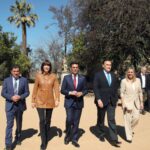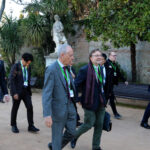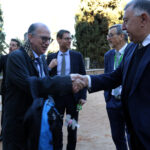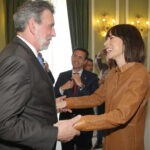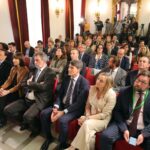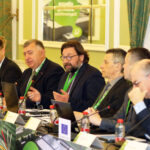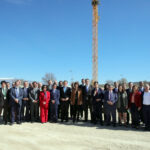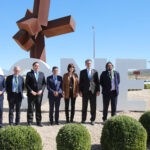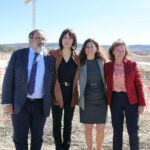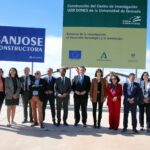The DONES Steering Committee agrees to the start of the construction phase of the Granada particle accelerator
Posted on |
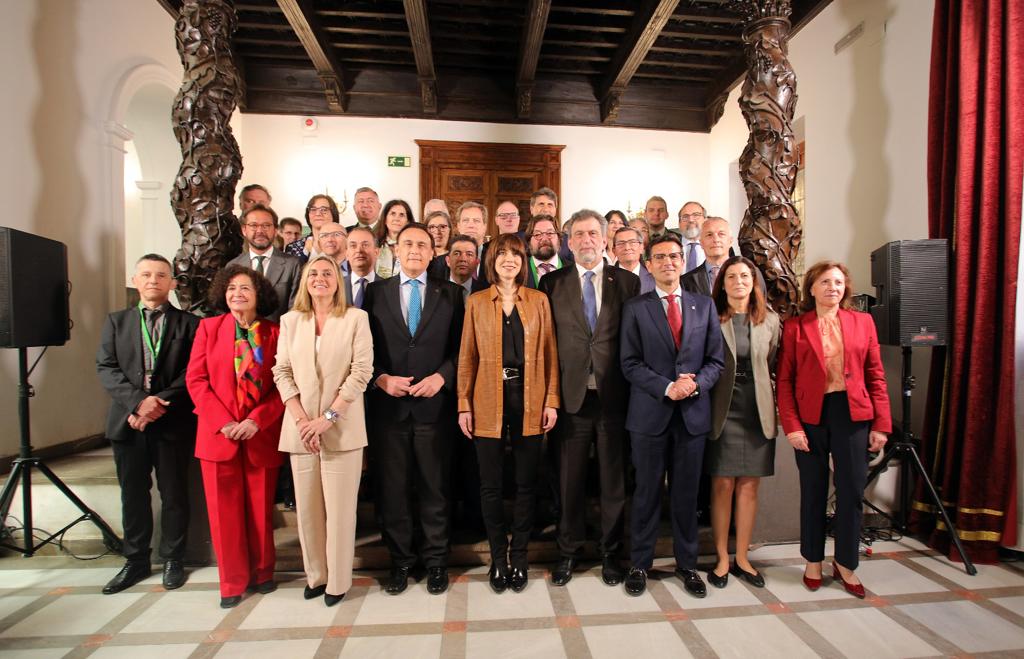 The DONES Steering Committee, the highest governing body of the DONES Programme, has agreed to in its first meeting the start of the construction of the IFMIF-DONES scientific infrastructure in Escúzar (Granada). Representatives from 15 EU countries and Japan, as well as from the organisations EURATOM, EUROfusion and Fusion for Energy participated at the meeting held on 16 March in Granada.
The DONES Steering Committee, the highest governing body of the DONES Programme, has agreed to in its first meeting the start of the construction of the IFMIF-DONES scientific infrastructure in Escúzar (Granada). Representatives from 15 EU countries and Japan, as well as from the organisations EURATOM, EUROfusion and Fusion for Energy participated at the meeting held on 16 March in Granada.
Stasa Skenzic, a member of the Croatian delegation, has been appointed chairman of the highest governing body of IFMIF-DONES, while the secretariat will be provided by the Spanish delegation. The DONES Steering Committee has also agreed with the constitution of the working group that will develop the DONES Programme.

This meeting was attended by representatives from Spain, Croatia, Italy, Germany, France, Austria, Belgium, Czech Republic, Finland, Hungary, Latvia, Lithuania, Romania, Slovakia, Slovenia and Japan, as well as the international organisations EURATOM, EUROfusion and Fusion for Energy (F4E).
At the end of the meeting, the Minister of Science and Innovation, Diana Morant, announced the preparation of a Strategic Plan that includes a Specific Staffing Plan to prepare the recruitment of 200 highly qualified professionals who will join the IFMIF-DONES team over the next 3 years.
“Although work on the first auxiliary buildings, which are being co-financed with ERDF funds, started at the end of last year and will be completed by the end of this year or early 2024, we can announce that the IFMIF-DONES team continues to work so that in 2025 we can start work on the Main Building in Escúzar, which will house the particle accelerator and the rest of the main systems of this important scientific infrastructure,” added Morant.
“To make all this possible, and as a sign of Spain’s commitment to the project, we announce that the Spanish Government has already reserved 93 million euros from the ERDF path of the 2021-2027 programming period for IFMIF-DONES,” the minister said. To this amount must be added, she said, the Innovative Public Procurement associated with prototypes of relevant components of IFMIF-DONES that the CDTI, in collaboration with IFMIF-DONES Spain, is currently managing for about 30 million euros and whose public tenders are expected this summer.
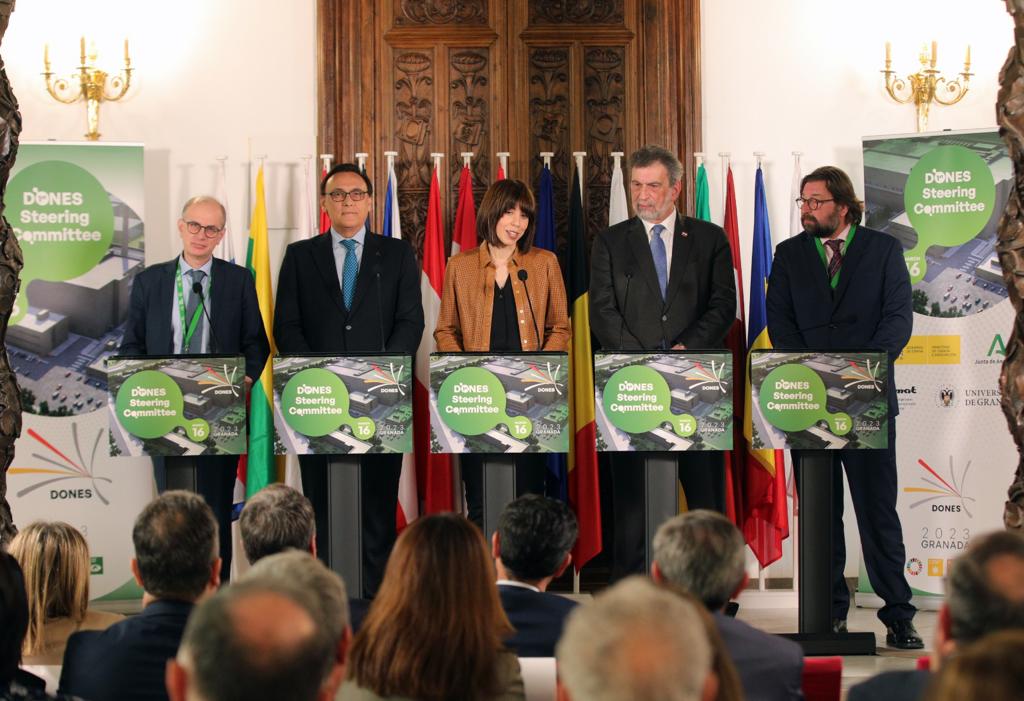
José Carlos Gómez, Andalusian Minister of University, Research and Innovation, recalled that the impact of this accelerator will bring economic benefits on an international scale: “In Spain alone, the production of goods and services is expected to increase by €6,133 million (79.0% of the total generated by the project), which will raise the GVA by €2,752 million, with an estimated increase in GVA of €687 million for Andalusia (an annual average of €20 million)”.
In this sense, he added: “The Andalusian Regional Government will contribute one euro for every euro contributed by the Ministry. This is what we have been doing so far, committing the necessary amounts to get the project off the ground, and we will continue to do so hand in hand with the Ministry until it becomes a reality”. Therefore, the Junta will allocate another 93 million euros from the ERDF path of the 2021-2027 programming period for IFMIF-DONES.
“We are finalising the new agreement that will formalise the contributions from the Junta-Estado Consortium for the construction of the scientific facilities, which will be financed 50% by both administrations through ERDF funds and will be developed over a ten-year time horizon,” said the minister.
About the DONES Programme
Fusion energy has been one of humanity’s most significant scientific challenges since the 1950s. It is a safe, sustainable and massive energy source based on an inexhaustible fuel distributed throughout the planet, which could meet the energy needs in the second half of this century. This objective will materialise in the future European demonstration power plant, DEMO (DEMOnstration power plant). This plant will confirm the technological and economic feasibility of fusion energy, with continuous operation and injection of energy into the electricity grid. To do this, DEMO needs to build on all the development acquired in ITER and the Fusion Programme, but it also requires the most critical materials of its internal structure to be tested.
One of the key challenges in realising fusion energy is the development of neutron-tolerant materials that can withstand a neutron flux of up to 14 MeV while maintaining good physical and structural properties for extended periods. Currently, engineering materials data, properties and rules are based on fission neutron irradiation campaigns and do not fully cover neutron energies, temperature and other operating conditions.
The mission of the DONES programme will be to develop a database of the effects on materials of neutron irradiation similar to those produced in fusion reactions, which is essential for the design and construction of future fusion reactors. Therefore, to test materials and grow this knowledge, it is necessary to develop a neutron source with a spectrum similar to that of fusion; this neutron source will be able to reproduce the irradiation conditions of future fusion reactors, is IFMIF-DONES.
The IFMIF-DONES scientific infrastructure is the central element of the DONES Programme, which aims to establish a comprehensive database on fusion materials.
In IFMIF-DONES, a particle accelerator will produce a deuteron beam (D+) of 125 mA current and 40 MeV energy, impacting a 25 mm thick liquid lithium curtain flowing at 15 m/s. The reactions in the lithium target, upon the impact of the deuteron beam, will generate a high-energy neutron flux of sufficient intensity to simulate, in an accelerated manner, the damage that neutrons would produce in a fusion reactor. This neutron flux will be used to irradiate material samples located immediately behind the lithium curtain in the test modules of the irradiation area.
About IFMIF-DONES
The International Fusion Materials Irradiation Facility: Demo Oriented NEutron Source (IFMIF-DONES) is a unique scientific infrastructure in the world where materials for future fusion power plants will be tested, validated and qualified as DEMO (a prototype demonstration fusion reactor).
About this international project, in December 2017, Fusion for Energy (F4E) positively assessed the joint Spanish and Croatian proposal to locate IFMIF-DONES in Granada.
The European Strategy Forum on Research Infrastructures (ESFRI) included IFMIF-DONES in its 2018 Roadmap as a project within the energy area, and it currently appears in the 2021 Roadmap. IFMIF-DONES thus becomes one of ESFRI’s critical infrastructures, positioning itself as a relevant strategic infrastructure for European scientists in energy research and innovation.
IFMIF-DONES will therefore be a unique international facility. In addition to its relevance for the development of fusion as an energy source, it will also be very relevant in other areas of research and knowledge that will benefit from its technology, such as medicine, particle physics, fundamental physics studies, and industry… All this is on a planet that is increasingly committed to sustainable development and using clean, safe and efficient energy.
The IFMIF-DONES project is an initiative of the National Fusion Laboratory of the Energy, Environmental and Technological Research Centre (CIEMAT), which the IFMIF-DONES España Consortium is currently developing.
The IFMIF-DONES España Consortium is a research entity shared equally between the General State Administration and the Autonomous Community of Andalusia.
